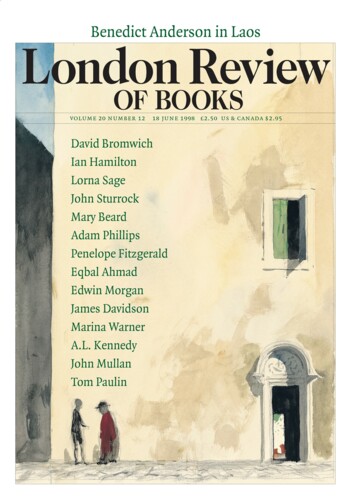The View from the Passenger Seat: Gilbert Adair
Lorna Sage, 1 January 1998
Gilber Adair the critic writes with feeling and practised bitterness about the anxiety of influence – ‘that looming, lowering pressure exerted, wilfully or not, by those who have already “made it” on those who have not, a pressure cramping, crushing and on occasion castrating the creative energies of the rising generation’. There’s a smack of Hamlet (cabined, cribbed, confined) here – so that when the literary father-figures he has in mind turn out to be Martin Amis, Julian Barnes and Ian McEwan, it’s hard to believe him. Father’s ghost has to be grander. And he is. Adair the novelist’s true problem, which Amis notoriously shares, is with Nabokov. Adair’s 1990 novel Love and Death on Long Island, ‘currently’, according to his publicity, ‘being made into a major motion picture’, was about a snobbish, reclusive British writer falling hopelessly in love at long distance with an irretrievably straight American boy starlet, but was ‘really’ about its writer’s own love-affair with Lolita, invoking shades of Death in Venice as a thin disguise. This movie will follow on the heels of the ‘controversial’ remake of Lolita.’‘





